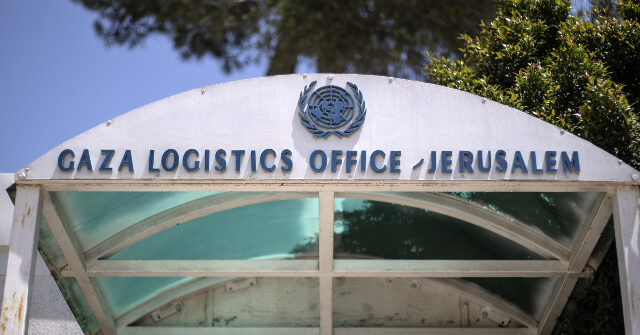The Israeli government ordered the United Nations Relief and Works Agency (UNRWA), the relief agency for Palestinians, to cease operations in its territory by Thursday, January 30.
The Israeli government condemned UNRWA as a “failure” and said it has allowed Hamas terrorists to infiltrate its staff.
“It is intolerable for any sovereign state to facilitate the operations of an agency that threatens its national security,” Israel’s ambassador to the U.N., Danny Danon, said on Tuesday as the shutdown deadline loomed.
“This decision reflects the reality that UNRWA has miserably failed in its mandate, and it has failed the people who were supposed to benefit from its services,” he said.
“I watched the hypocrisy of many countries in the U.N. Security Council this week. Their representatives spoke about how UNRWA is an indispensable part of Gaza’s reconstruction and how it cannot operate without it. Well, no, UNRWA only brings suffering to the people of Gaza, and just like Hamas, it has brought destruction to Gaza,” said Israeli Member of the Knesset (MK) Yulia Malinovsky.
Malinovsky was one of the authors of legislation passed by the Israeli parliament in October that banned UNRWA from operating on Israeli territory. The bill ordered UNRWA to shut down its facilities in Jerusalem and halt official communications with Israeli officials, effective January 30, 2025.
MK Dan Illouz, who introduced the bill banning UNRWA, told the Jerusalem Post (JP) on Thursday that the organization has clearly become a political instrument for the Palestinians and a self-perpetuating bureaucracy that enables the very same calamity it milks for political influence and money.
“No other refugee population had an agency like UNRWA. Every other refugee crisis was resolved through resettlement and integration. But UNRWA did the opposite: it inflated the number of refugees, ensured they remained stateless, and indoctrinated them to believe their only future was through ‘return’ – a euphemism for Israel’s destruction,” Ilouz said.
“Their schools didn’t educate – they radicalized. Their employees didn’t provide aid – they collaborated with terrorists. Their facilities didn’t house civilians – they stored Hamas weapons,” he said.
“UNRWA employees actively participated in the October 7 massacre. They murdered civilians. They helped Hamas kidnap women and children. Some of them literally fought alongside terrorists,” he charged.
Ilouz said all of this was well-known to the U.N. and foreign governments, but they “kept sending money to serve their own political interests.”
“If they truly cared about Palestinians, they would have dismantled UNRWA decades ago,” he said.
The ban on operations in Israel will make it extremely difficult for UNRWA to work in Gaza or the West Bank. The Israeli government says other humanitarian groups and U.N. agencies can take UNRWA’s place, including UNICEF and the World Food Program (WFP), while critics of the ban insist UNRWA is irreplaceable.
UNRWA chief Philippe Lazzarini told the U.N. Security Council (UNSC) two weeks ago that the Israeli ban would “massively weaken the international humanitarian response” in Gaza, and “immeasurably worsen already catastrophic living conditions.”
Lazzarini said UNRWA’s personnel and services are “tightly woven into the social fabric of Gaza,” and its “ability to directly provide education and primary healthcare far exceeds that of any other entity.”
“A chaotic dismantling of UNRWA will irreversibly harm the lives and future of Palestinians. It will obliterate their trust in the international community and any solution it attempts to facilitate,” he said.
Lazzarini returned to that point last week, warning that the ban on UNRWA “might sabotage the Gaza ceasefire.”
“Only in the first 3 days of the ceasefire, UNRWA brought in food for one million people. Our teams already distributed food to around 300,000 people including in northern Gaza,” he said.
Lazzarini was implying that banning UNRWA would make it impossible for Israel to meet its ceasefire commitment of delivering 4,200 truckloads of humanitarian assistance to Gaza every week. Israeli officials insisted they could meet this commitment without UNRWA.
UNRWA’s Gaza director, Sam Rose, said there are several weeks of supplies stockpiled in Gaza, so the distribution of aid will not be instantly halted by the UNRWA ban. Israeli officials have also hinted they might temporarily waive the UNRWA ban so thousands of truckloads of supplies kept in Israel could be hauled into Gaza.
“The curtain won’t fall all at once,” Danon said.
U.S. envoy to the United Nations Dorothy Shea told UNSC that UNRWA “exaggerating the effects of the laws and suggesting that they will force the entire humanitarian response to halt is irresponsible and dangerous.”
“What is needed is a nuanced discussion about how we can ensure that there is no interruption in the delivery of humanitarian aid and essential services,” she said.
Read the full article here


